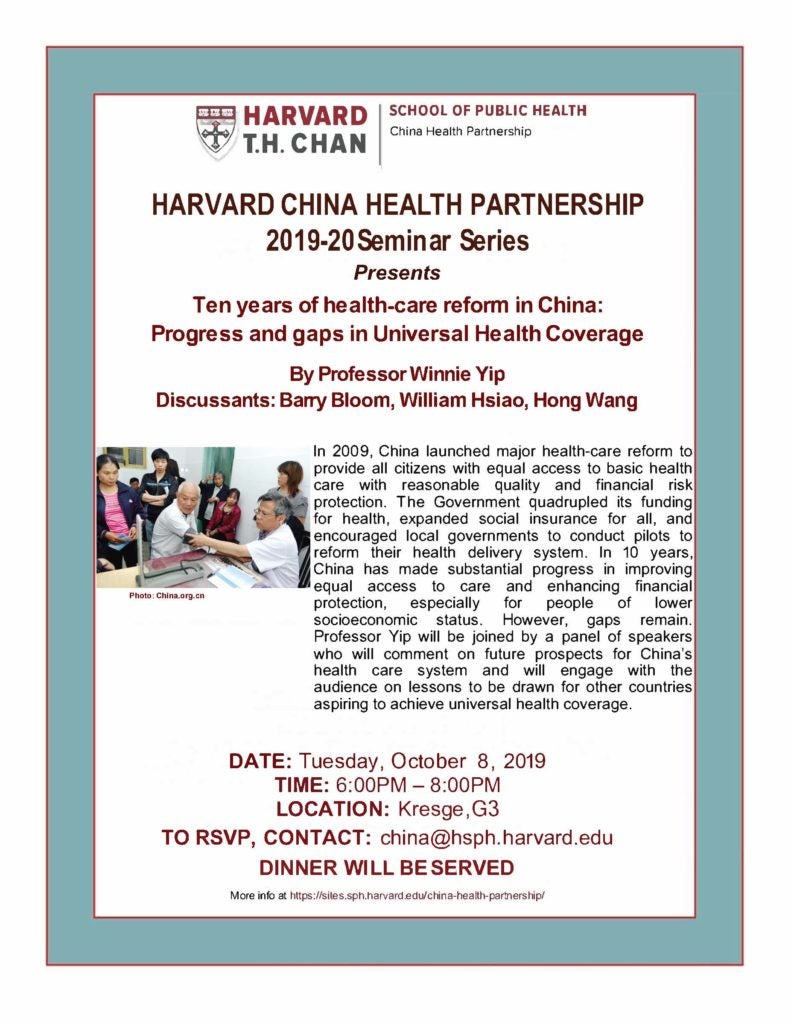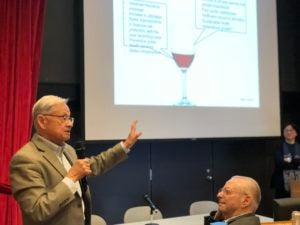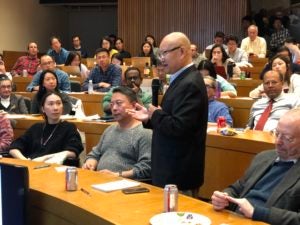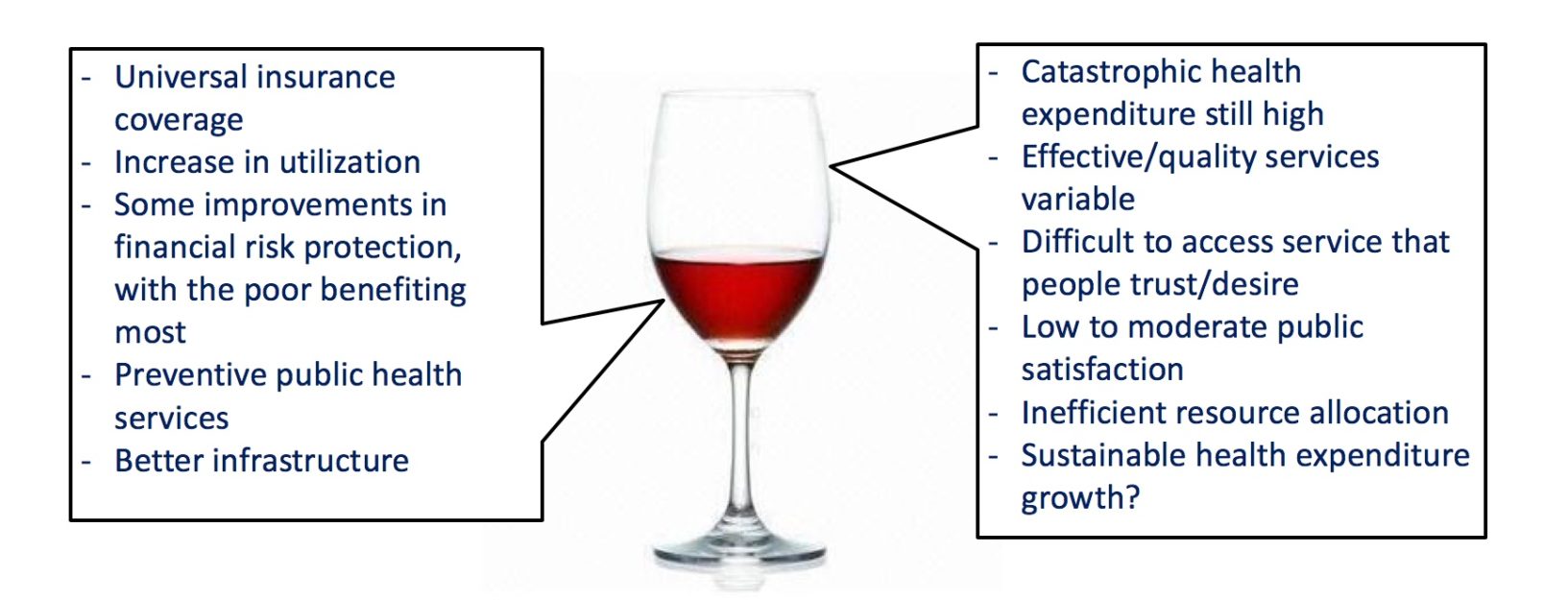Harvard Worldwide Week
China Health Partnership Seminar
“The glass can be seen as half empty or as half full,” remarked Dr. Winnie Yip, Professor of the Practice of Global Health Policy and Economics and also Director of the school-wide China Health Partnership. Dr. Yip was sharing observations of the past decade of health reform in China to a packed audience of 90 students, researchers and faculty this past week. Dr. Yip led a major review on China’s reform recently published in The Lancet, and this seminar was an opportunity to share the findings on Harvard’s campus as part of the Harvard Worldwide Week initiative organized by Harvard’s Vice Provost for International Affairs. In addition, over a hundred members of the China Health Policy and Management Society participated over live video stream.
Thinking about the glass being half-full, Dr. Yip highlighted that China expanded health insurance coverage for 1.4 billion people in just a few years—from 30 percent before the reform launched in 2009 to over 95% by 2011. No other country has achieved such rapid expansion of social insurance on that scale. The government also poured money into the health system, quadrupling public funding for health in a decade for initiatives such as expanding infrastructure, using subsidies to entice people to register for social health insurance, and making preventative care free for all. Based on evidence from the first phase of the reform, a second phase launched in 2012 further targeted healthcare delivery and financing. A policy that had allowed profit seeking through the mark up of drugs was removed, and the fee structure and incentives of hospitals and providers was adjusted. As a result of this decade-long commitment to using evidence to drive reform, utilization of health services has increased, out of pocket expenditure on health has decreased, and most measures of catastrophic health expenditure improved with the poor benefitting the most.
The glass is also half-empty and many challenges related to hospitals remain. The increase in health care utilization has been driven by increases in hospital admission—now reaching 14%—that reflect the complex combination of increased demand as well as high reliance on hospitals for outpatient care. Health expenditure has outpaced GDP growth, and while that growth is partly attributable to rising expectations of the population, the changing demographic composition of an aging population, and the frontier of new medical technologies, Dr. Yip and her team also found that the heavy allocation of resources to hospitals is a significant contributing cause. Over 57 percent of health expenditure is concentrated at tertiary hospitals, compared to 18.1 at primary care facilities. Indicators of the clinical quality of primary care in the era of noncommunicable diseases are also troubling: nearly 50 percent of the adult population has hypertension but only 3.2 percent is controlled; similarly, 10.9 percent of the population has diabetes but less than half of those are controlled.
Three invited discussants added perspective to the discussion. Dr. Wang Hong, Senior Program Officer, Bill and Melinda Gates Foundation, China, added that the fragmentation of the delivery system makes it difficult to sustain progress. Hospitals need robust IT systems to differentiate types of patients and various insurance schemes, and the incentives for referrals and back-referrals between the levels of the heath system operate with too much friction. Dr. William Hsiao, Professor Emeritus, Harvard T.H. Chan School of Public Health, reflected on China’s governance model that has simultaneously enabled the strong arm of bureaucracy to quickly enroll the population while also allowing a large number of ministries to be involved in the broader concept of health, complicating effective policies and financial incentives to influence hospital management. Dr. Barry Bloom, Joan L. and Julius H. Jacobson Research Professor of Public Health, Harvard T.H. Chan School of Public Health, identified problems that China and the United States share in hospital reform: how to integrate multiple insurance payment systems, improve quality of care, and contain costs. In the ensuing discussion, the audience asked the speakers to identify their most pressing health issue for national action in China how better integration across China’s fragmented health system could be achieved.
Resources
- For more details on the past ten years of health reform in China, please see the review article led by Dr. Yip in The Lancet in English and in Chinese.
- Video recording of the seminar is available here.




Resources
- An abstract and the full-length English and Chinese texts of the review article published in The Lancet evaluating 10 years of healthcare reform in China are available here.
- An introduction of the 10 year review article by Sir Richard Horton, editor-in-chief of The Lancet, and an interview with the article’s main authors Professor Winnie Yip and Professor Wen CHEN are available here.
- “Seminar on Ten-Year Health Care Reform in China: Review of Its Progress and Future Trajectory” held in conjunction with the State Council’s Development Research Center
- Seminar on Ten-Year Health Care Reform in China at Tsinghua University

